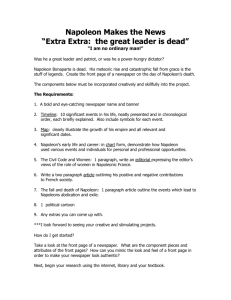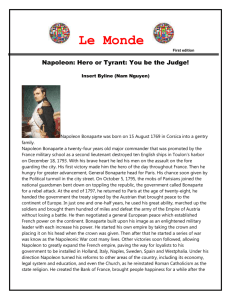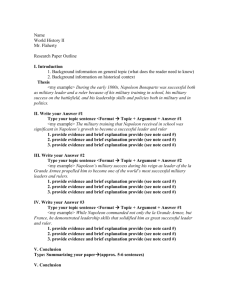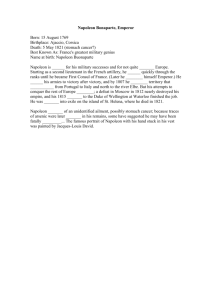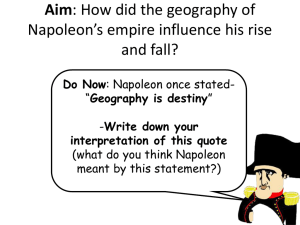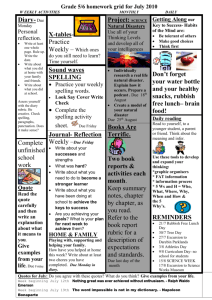SHOULD NAPOLEON BE SEEN AS A GOOD LEADER
advertisement
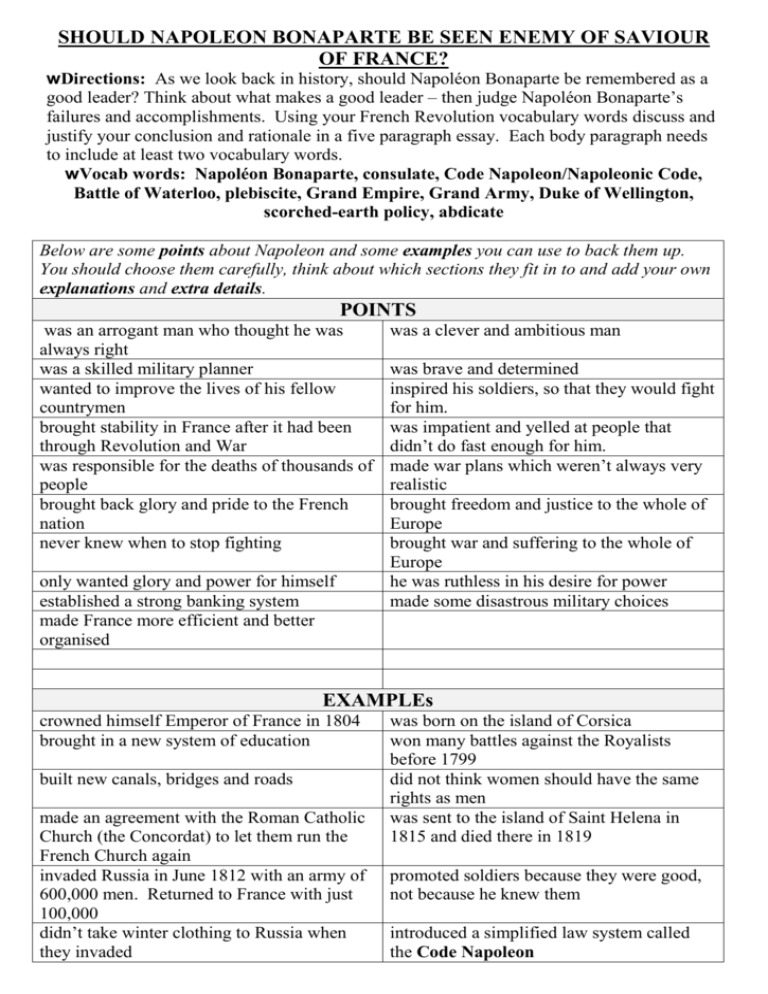
SHOULD NAPOLEON BONAPARTE BE SEEN ENEMY OF SAVIOUR OF FRANCE? wDirections: As we look back in history, should Napoléon Bonaparte be remembered as a good leader? Think about what makes a good leader – then judge Napoléon Bonaparte’s failures and accomplishments. Using your French Revolution vocabulary words discuss and justify your conclusion and rationale in a five paragraph essay. Each body paragraph needs to include at least two vocabulary words. wVocab words: Napoléon Bonaparte, consulate, Code Napoleon/Napoleonic Code, Battle of Waterloo, plebiscite, Grand Empire, Grand Army, Duke of Wellington, scorched-earth policy, abdicate Below are some points about Napoleon and some examples you can use to back them up. You should choose them carefully, think about which sections they fit in to and add your own explanations and extra details. POINTS was an arrogant man who thought he was always right was a skilled military planner wanted to improve the lives of his fellow countrymen brought stability in France after it had been through Revolution and War was responsible for the deaths of thousands of people brought back glory and pride to the French nation never knew when to stop fighting only wanted glory and power for himself established a strong banking system made France more efficient and better organised was a clever and ambitious man was brave and determined inspired his soldiers, so that they would fight for him. was impatient and yelled at people that didn’t do fast enough for him. made war plans which weren’t always very realistic brought freedom and justice to the whole of Europe brought war and suffering to the whole of Europe he was ruthless in his desire for power made some disastrous military choices EXAMPLEs crowned himself Emperor of France in 1804 brought in a new system of education built new canals, bridges and roads made an agreement with the Roman Catholic Church (the Concordat) to let them run the French Church again invaded Russia in June 1812 with an army of 600,000 men. Returned to France with just 100,000 didn’t take winter clothing to Russia when they invaded was born on the island of Corsica won many battles against the Royalists before 1799 did not think women should have the same rights as men was sent to the island of Saint Helena in 1815 and died there in 1819 promoted soldiers because they were good, not because he knew them introduced a simplified law system called the Code Napoleon wanted his troops to ‘live off the land’ wasn’t prepared for the ‘scorched earth policy’, when the Russians destroyed their homes and crops then retreated defeated many different European countries before 1810 didn’t have a way of feeding his troops was sent to the island of Elba when he was first defeated in 1814 was defeated by Wellington at the Battle of Waterloo Introduction introduced the metric system into all of Europe Wanted to start a Grand Empire to replace the Holy Roman Empire. thought he could defeat Russia in only one month (poor plan) freed many Europeans from working as serfs for their lords escaped from Elba and raised an army of one million men who he marched to Paris Name: Napoleon is one of the most famous people in history. Some people see him as a great man who rescued France and led it to many glorious victories. Other people see him as powerobsessed man who was only interested in his own glory. He was born... [describe his background] He achieved many things in his career such as... [give examples] which show he was a good leader. On the other hand, he made some serious mistakes as well. For example... [give an example] which makes him look like a bad leader. It is important to look at evidence on both sides in order to decide. Thesis: Remember, a thesis must make a claim that is debatable. (if you “buy” one of the examples below you will be charged 5 points). Napoléon Bonaparte’s accomplishments on the battlefield and as the ruler of France prove that he was a good leader. Although Napoléon Bonaparte was arrogant, his leadership on the battlefield and establishing a solid foundation for citizens in France after the revolution proves that he was a good leader. Although Napoléon Bonaparte accomplished some amazing things, his arrogance and wastefulness of money and lives prove he was a bad leader for France. Even though Napoléon Bonaparte’s was an excellent general, his greed and ruthlessness proves that he was a poor leader for France. Section 1 Point: In 1799, Napoleon took control of France and established… Evidence: He brought about many important changes which make him seem like a good leader. [Find examples of what he achieved] Explanation:: Evidence: Despite all of this, it could be said that he was not the best leader. [Find examples of what makes him look like a bad leader] Explanation: Link: Overall, as a leader of France, I think he was a good/bad leader because... Section 2 Point: Evidence: Explanation: Link: Section 3 Point: In 1812, Napoleon decided to invade Russia. He had already shown that he could win wars in Europe.[Find examples of victories in Europe] Evidence: After his victories in Europe, he made a plan to invade Russia. When it came to it, however, the plan didn’t work out. [Describe how and why the plan failed and what happened to Napoleon as a result] Explaination Link: Overall, Napoleon’s attempt to invade Russia shows that he was a good/bad leader because… Section 4 Napoleon managed to escape from the island of Elba in 1815. He showed what kind of a leader he was during the ‘Hundred Days’ when he tried to take back France and fight the Coalition of the British, Prussians and others. [Describe how he took back power and started the war again] Evidence: The Battle of Waterloo was Napoleon’s last chance to defeat his enemies and stay in power. He had some advantages… Despite this, he failed to defeat Wellington. [Describe his defeat and exile (being sent away from France) and death] Explanation: Conclusion Restate Thesis: There many ways in which Napoleon can be seen as a good leader and France’s hero.[Give your most important examples and explain] On the other hand, some can defend the idea that Napoleon can be seen as an enemy of France. [Give your most important examples and explain] In conclusion, I believe Napoleon should/should not be seen as a good leader because… SHOULD NAPOLEON BONAPARTE BE SEEN ENEMY OF SAVIOUR OF FRANCE? wDirections: As we look back in history, should Napoléon Bonaparte be remembered as a good leader? Think about what makes a good leader – then judge Napoléon Bonaparte’s failures and accomplishments. Using your French Revolution vocabulary words discuss and justify your conclusion and rationale in a five or six paragraph essay. Each body paragraph needs to include at least two vocabulary words. (2pt. each) TO RECEIVE POINTS – You must underling or boldface the vocabulary words and follow them with the definition in parenthesis. *Example: Although he originally appointed himself First Counsel, two years later Napoleon Bonaparte was elected First Counsel for life after a plebiscite (popular vote). Your essay will be grading using the WHS History AV rubric (below). Read it carefully and use it as a guide to earning full points. You may choose to present your essay orally or on video. The due date of the video is the same as the paper. For presentations, see me and we will arrange for a day next week. wVocab words: Napoléon Bonaparte, consulate, plebiscite, Code Napoleon/Napoleonic Code, Battle of Waterloo, Grand Army, Duke of Wellington, scorched-earth policy, abdicate Body paragraph #1 Vocab _________________/4 Body paragraph #2 Vocab ________________/4 Body paragraph #3 Vocab ________________/4 Body paragraph #4 Vocab ________________/4 (optional) Total points: _____________/36 Waimea high school history academic vocabulary rubric DISCUSSION D TEXT WORODS 1 ASSIGNMENT USE IN WIRITING USE IN COMPREHEN KNOWLEDGE OF CONTENT criteria 3 4 Demonstrates little or no knowledge of content words and is unable to offer simple responses or examples regarding the word. Provides simple explanations of content words; does not provide examples 2 Provides complete definitions of content words and offers examples and non-examples of the word. Provides extensive explanations of content with numerous examples and nonexamples; offers many associations to other related words; is able to compare and contrast content words through specific features of the word. Demonstrates difficulty in comprehending text due to a lack of knowledge of content words. Comprehends most of the text as a result of some knowledge of content words. Comprehends the text as a result of knowledge of content words. Rarely uses content words in orally presented assignments Uses some content words, often with a low to average degree of accuracy in orally presented assignments. Uses a large number of content words with a moderate degree of accuracy in orally presented assignments. Comprehends the text and makes reference or connections to many of the content words in response to the reading. Uses an extensive number of content words with a high degree of accuracy in orally presented assignments. Rarely uses content words in writing assignments. Uses some content words, often with a low to average degree of accuracy in writing assignments. Uses a large number of content words with a moderate degree of accuracy in writing assignments Uses an extensive number of content words with a high degree of accuracy in writing assignments.
